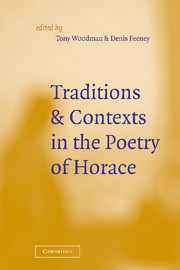Book contents
- Frontmatter
- Contents
- List of contributors
- Prologue
- Acknowledgements
- 1 HORACE'S BIRTHDAY AND DEATHDAY
- 2 AMICVS CERTVS IN RE INCERTA CERNITVR: Epode I
- 3 DREAMING ABOUT QUIRINUS: Horace's Satires and the development of Augustan poetry
- 4 BIFORMIS VATES: the Odes, Catullus and Greek lyric
- 5 THE ODES: just where do you draw the line?
- 6 A WINE-JAR FOR MESSALLA: Carmina 3.21
- 7 FEMININE ENDINGS, LYRIC SEDUCTIONS
- 8 THE UNIQUENESS OF THE CARMEN SAECVLARE AND ITS TRADITION
- 9 SOLVS SAPIENS LIBER EST: recommissioning lyric in Epistles 1
- 10 POETRY, PHILOSOPHY, POLITICS AND PLAY: Epistles 1
- 11 HORACE, CICERO AND AUGUSTUS, OR THE POET STATESMAN AT EPISTLES 2.1.256
- 12 VNA CVM SCRIPTORE MEO: poetry, Principate and the traditions of literary history in the Epistle to Augustus
- 13 EPILOGUE
- Notes
- Abbreviations and bibliography
- Indexes
2 - AMICVS CERTVS IN RE INCERTA CERNITVR: Epode I
Published online by Cambridge University Press: 22 September 2009
- Frontmatter
- Contents
- List of contributors
- Prologue
- Acknowledgements
- 1 HORACE'S BIRTHDAY AND DEATHDAY
- 2 AMICVS CERTVS IN RE INCERTA CERNITVR: Epode I
- 3 DREAMING ABOUT QUIRINUS: Horace's Satires and the development of Augustan poetry
- 4 BIFORMIS VATES: the Odes, Catullus and Greek lyric
- 5 THE ODES: just where do you draw the line?
- 6 A WINE-JAR FOR MESSALLA: Carmina 3.21
- 7 FEMININE ENDINGS, LYRIC SEDUCTIONS
- 8 THE UNIQUENESS OF THE CARMEN SAECVLARE AND ITS TRADITION
- 9 SOLVS SAPIENS LIBER EST: recommissioning lyric in Epistles 1
- 10 POETRY, PHILOSOPHY, POLITICS AND PLAY: Epistles 1
- 11 HORACE, CICERO AND AUGUSTUS, OR THE POET STATESMAN AT EPISTLES 2.1.256
- 12 VNA CVM SCRIPTORE MEO: poetry, Principate and the traditions of literary history in the Epistle to Augustus
- 13 EPILOGUE
- Notes
- Abbreviations and bibliography
- Indexes
Summary
DATES, CONTEXTS AND PERSPECTIVES
The latest datable reference in the Epodes is the battle of Actium. In the central poem, Epode 9, Horace vividly recapitulates the main phases of the campaign, which culminated in the sea battle of 2 September 31 bc. The dramatic setting would appear to be the evening of the day of the battle, when, according to Suetonius, Caesar and his forces had spent the night at sea. In 32 bc, Caesar had taken care to see that the war had been declared on Cleopatra alone and that she alone was hostis. By omitting Antony, Caesar contrived to leave the way open for as many as possible of his supporters to transfer allegiance, and Dio has both Antony and Caesar, in their harangues to their troops immediately before the battle, dwell on the fact that Antony had not been declared hostis. But it is clear that at some point Antony was formally declared hostis. This would seem most probably to have happened when the many senators who had accompanied Caesar to Actium had returned to Rome: having seen Antony fight alongside the public enemy and against themselves, they would have no hesitation in now declaring him hostis. The language of Epodes 9.27 (terra marique uictus hostis) reflects the language of the official decrees recognising Caesar's victory, according him the triumph which would be celebrated in 29 bc, and sanctioning the foundation of Nicopolis on the site of Caesar's camp at Actium, where the dedication reads:
Imperator Caesar Diui Iuli filius uictoriam consecutus bello quod pro re publica gessit in hac regione consul quintum imperator septimum pace parta terra marique Neptuno et Marti castra e quibus ad hostem insequendum egressus est naualibus spoliis exornata consacrauit.
- Type
- Chapter
- Information
- Traditions and Contexts in the Poetry of Horace , pp. 17 - 37Publisher: Cambridge University PressPrint publication year: 2002



